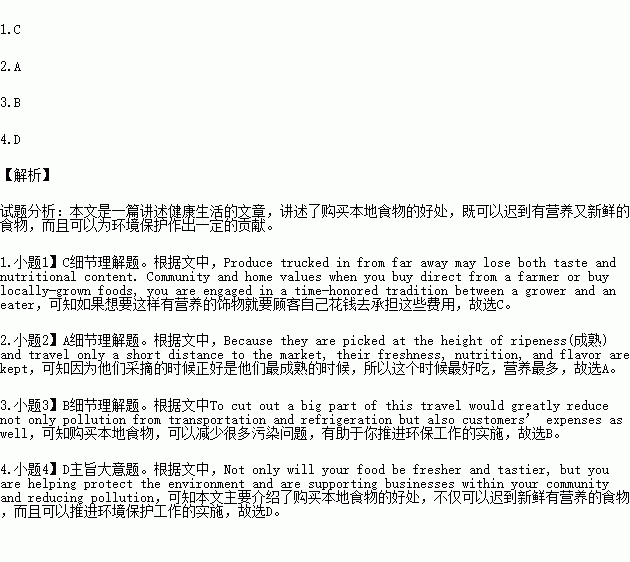题目内容
The Horn of Plenty is one of the largest natural health food stores within the Greater Hamilton area. We are big supporters of buying locally and we are here to tell you why it is so important for your family, the community and the environment. The concept of buying locally is simple: buy food produced, grown, or raised as close to your home as possible. Not only will your food be fresher and tastier, but you are helping protect the environment and are supporting businesses within your community and reducing pollution.
Better for the environmentSustainabilityand global warming are such hot topics at the moment, and many people want to do their bit to help support a healthier environment. Small action carried out by many people can make a big difference. Most materials in an average North American meal have traveled about 1,500 miles to get from farm to plate. To cut out a big part of this travel would greatly reduce not only pollution from transportation and refrigeration but also customers’ expenses as well.
Taste and nutritional content Locally-grown fruits and vegetables are usually sold within 24 hours of being harvested. Because they are picked at the height of ripeness(成熟) and travel only a short distance to the market, their freshness, nutrition, and flavor are kept. Produce trucked in from far away may lose both taste and nutritional content. Community and home valueswhen you buy direct from a farmer or buy locally-grown foods, you are engaged in a time-honored tradition between a grower and an eater. You also help keep dollars within your community.
1.It can be inferred from the third paragraph that ___________.
A. global warming is the most serious problem now
B. North American food is rich in various kinds of materials
C. the increased cost of transporting food is passed on to the customers
D. most people support buying locally
2.Locally-grown fruits and vegetables taste good mostly because___________.
A. they are picked when they are fully grown
B. they are not polluted by chemical fertilizer
C. they can be harvested at any time
D. they are sent to the market at a high speed
3.According to the author, when you buy locally-grown foods ___________.
A. you can see how fruits and vegetables grow
B. you will contribute to protecting the environment
C. you will become much healthier and prettier
D. you are making money from your community
4.What does the passage mainly talk about?
A. The way to keep your food tasty and healthy.
B. The popularity of the Horn of Plenty.
C. The importance of protecting the environment.
D. The benefits of buying locally.
There are some strange driving laws in different countries.
Countries | Laws |
Vietnam | If you’re in Vietnam without a Vietnamese driver’s license, you risk a prison sentence of up to three years. |
Russia | In Moscow, if your car is dirty enough to draw dust art, you will be fined about 2,000 rubles (about US 55 dollars). Worse yet, it’s illegal to wash your car by hand in public places – forcing you to take it to one of the few car wash facilities. |
Thailand | Drivers – male or female – can’t drive shirtless whether it’s a car, bus, or a tuk-tuk cab. |
France | France requires its drivers to carry a portable breathalyzer(便携式酒精测量仪) at all times when driving a car. The one-time breathalyzer cost around US 5 dollars, and if you don’t have one, you will be fined US 15 dollars. |
Cyprus | Raising your hands in the car can get you fined of US 35 dollars. The law states a driver can be fined if the person “is in an irregular position inside the car or raises his hand from the steering wheel unnecessarily.” |
Japan | Politeness isn’t just the culture in Japan; it is part of driving laws. Splashing(飞溅) a person by driving through a puddle(水坑) with your car will cost you over US 60 dollars. The country is also strict with its DUI (酒驾) laws – riding with or lending your car to a driver who gets caught drinking and driving can lead to a fine costing thousands of dollars. |
1.Where should you go to wash your car when you are in Moscow?
A. The car wash facilities. B. Any public place.
C. Your home. D. The forest.
2.What can you get fined for in Cyprus?
A. Forgetting to carry a portable breathalyzer.
B. Not having a Cyprus driver’s license.
C. Putting your hands above your head.
D. Driving without a shirt.
3.If you are fined thousands of dollars in Japan, you may have been ________________.
A. in an irregular position in your car
B. sitting in a car with a drunk driver
C. splashing a person with mud
D. impolite to other drivers
4.This passage can most likely be found in __________.
A. a law document
B. a fashion magazine
C. an international newspaper
D. a book on interesting cultures


 viding transport. They can buy it at a good price, then give it to those people instead of asking for food from overseas, which is very bad. When we are throwing away food, they are asking for food from overseas.”
viding transport. They can buy it at a good price, then give it to those people instead of asking for food from overseas, which is very bad. When we are throwing away food, they are asking for food from overseas.” r’s _________ .
r’s _________ .